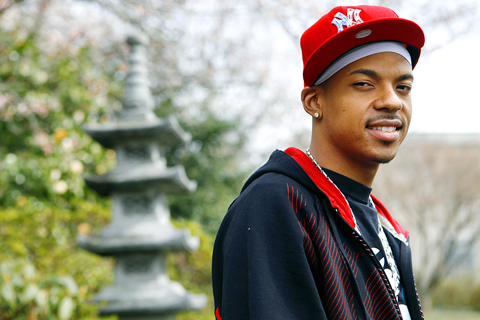As a boy, Jerome White Jr often spent weekends at his grandparents’ house, where a melodramatic genre of Japanese music called enka would waft in the background.
White’s Japanese grandmother, Takiko, had met his grandfather, an African-American serviceman, at a dance during World War II. And it was in their Pittsburgh living room that the six-year-old and his grandma sang the postwar songs of love, loss and hardship. Even though he didn’t understand the enka lyrics at the time, his Japanese singing pleased his grandmother, who died in 2005.
“I loved her very much,” says White, now 27. “It just made me want to learn more songs and practice more.”

PHOTO: AP
Enka had an unwavering hook on White and it has made him a superstar in Japan, where he’s known as Jero. Named best new artist last year by Japan Record Awards — the Japanese version of the Grammys — White made his first major US appearance on Saturday during the opening ceremony of the National Cherry Blossom Festival in Washington before a diverse audience of several hundred. They cheered, waved and some even held up signs bearing his name.
White has helped reintroduce enka — long a favorite of older generations — to the Japanese, breathing new life into its melodies by incorporating touches of pop or rhythm and blues.
Most striking is his wardrobe. Traditional enka crooners perform in a suit or kimono, but White sings in masterful Japanese while dressed in baggy pants, a do-rag and a cocked-to-the-side baseball cap.
Seeing an African-American artist sing a “kind of perfect way of enka” in hip-hop fashion — “that’s totally sort of an amazing contrast to us,” says Hideo Fukushima, public affairs minister at the Japanese embassy, which invited White to perform at the festival.
White said he hopes to make enka more appealing to younger audiences.

VAGUE: The criteria of the amnesty remain unclear, but it would cover political violence from 1999 to today, and those convicted of murder or drug trafficking would not qualify Venezuelan Acting President Delcy Rodriguez on Friday announced an amnesty bill that could lead to the release of hundreds of prisoners, including opposition leaders, journalists and human rights activists detained for political reasons. The measure had long been sought by the US-backed opposition. It is the latest concession Rodriguez has made since taking the reins of the country on Jan. 3 after the brazen seizure of then-Venezuelan president Nicolas Maduro. Rodriguez told a gathering of justices, magistrates, ministers, military brass and other government leaders that the ruling party-controlled Venezuelan National Assembly would take up the bill with urgency. Rodriguez also announced the shutdown

Civil society leaders and members of a left-wing coalition yesterday filed impeachment complaints against Philippine Vice President Sara Duterte, restarting a process sidelined by the Supreme Court last year. Both cases accuse Duterte of misusing public funds during her term as education secretary, while one revives allegations that she threatened to assassinate former ally Philippine President Ferdinand Marcos Jr. The filings come on the same day that a committee in the House of Representatives was to begin hearings into impeachment complaints against Marcos, accused of corruption tied to a spiraling scandal over bogus flood control projects. Under the constitution, an impeachment by the

Exiled Tibetans began a unique global election yesterday for a government representing a homeland many have never seen, as part of a democratic exercise voters say carries great weight. From red-robed Buddhist monks in the snowy Himalayas, to political exiles in megacities across South Asia, to refugees in Australia, Europe and North America, voting takes place in 27 countries — but not China. “Elections ... show that the struggle for Tibet’s freedom and independence continues from generation to generation,” said candidate Gyaltsen Chokye, 33, who is based in the Indian hill-town of Dharamsala, headquarters of the government-in-exile, the Central Tibetan Administration (CTA). It

China executed 11 people linked to Myanmar criminal gangs, including “key members” of telecom scam operations, state media reported yesterday, as Beijing toughens its response to the sprawling, transnational industry. Fraud compounds where scammers lure Internet users into fake romantic relationships and cryptocurrency investments have flourished across Southeast Asia, including in Myanmar. Initially largely targeting Chinese speakers, the criminal groups behind the compounds have expanded operations into multiple languages to steal from victims around the world. Those conducting the scams are sometimes willing con artists, and other times trafficked foreign nationals forced to work. In the past few years, Beijing has stepped up cooperation